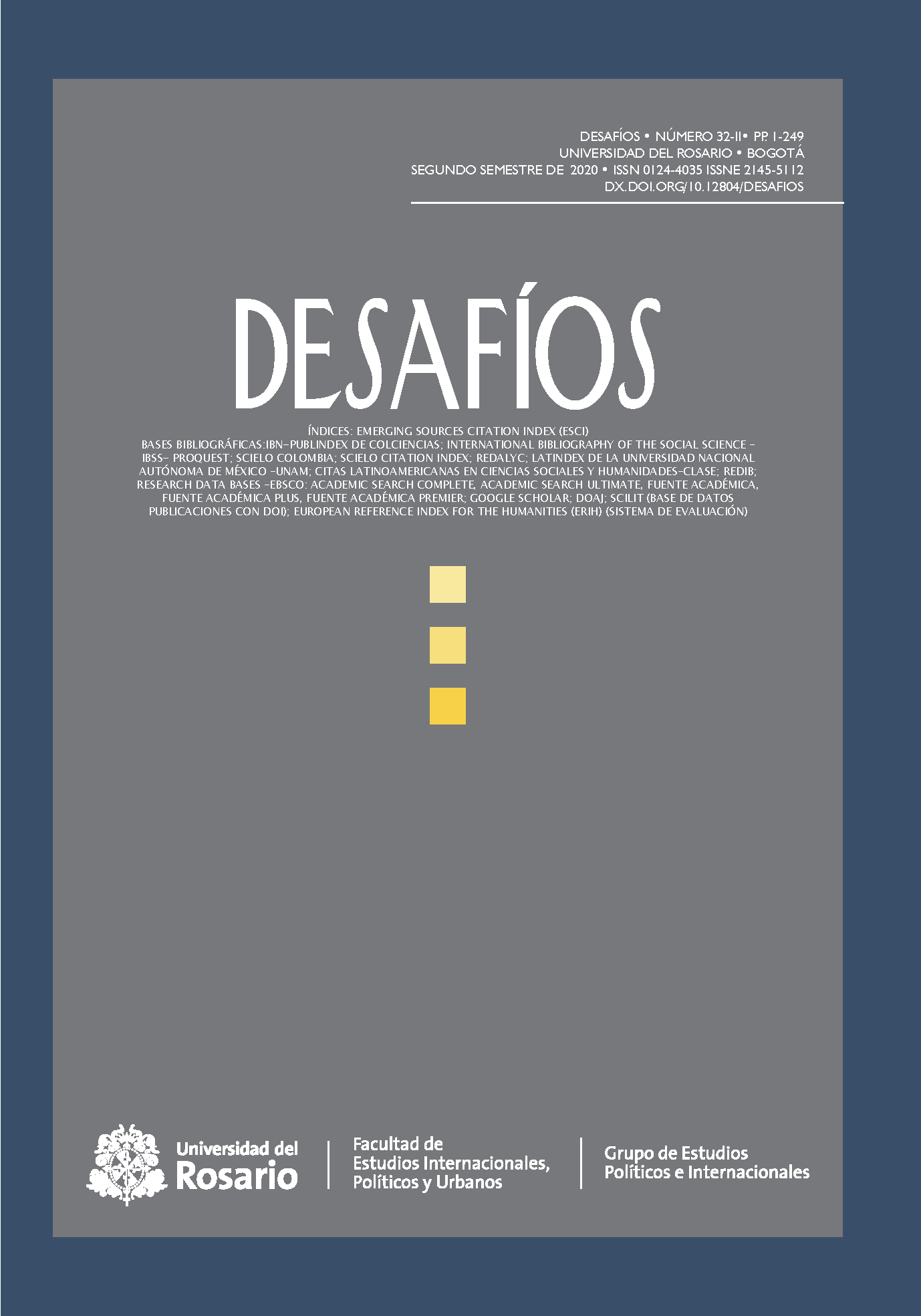Organizaciones no gubernamentales internacionales en el sistema de gobernanza global: ICAN y el tratado sobre la prohibición de las armas nucleares
Barra lateral del artículo
Contenido principal del artículo
El objetivo general de este artículo es demostrar el proceso por el cual una Organización Internacional No Gubernamental (OING), a partir del proceso de desarrollo de una pregunta marco en la agenda internacional fue capaz de influenciar resultados en una Organización Internacional. Específicamente, se buscó comprender el papel desempeñado por la ICAN (en inglés International Campaign to Abolish Nuclear Weapons) en la aprobación del Tratado sobre Prohibición de Armas Nucleares (TPAN) por la Asamblea General de las Naciones Unidas el 17 de julio de 2017. Siendo este el objetivo, en términos metodológicos, se adoptó el process-tracing, habiendo sido el mecanismo causal construido y guiado a partir del marco teórico propuesto por Jutta Joachim (2007). Finalmente, se espera contribuir a la literatura en Relaciones Internacionales al proponer un estudio centrado en los procesos de negociación en medio del sistema de gobernanza global, específicamente, en lo que concierne al papel de las OING y su interrelación con otros actores de relevancia internacional.
Descargas
Acheson, R. (2013). Wider consequences: Impact on development. In B. Fihn (Ed.), Unspeakable suffering: The humanitarian impact of nuclear weapons (pp. 58-65). Genebra: wilpf.
Allan, J., & Hadden, J. (2017). Exploring the framing power of ngos in global climate politics. Environmental Politics, 26(4), 600-620. https://doi.org/10.1080/09644016.2017.1319017
Avant, D., Finnemore, M., & Sell, S. (2010). Who Governs the Globe?. Cambridge: Cambridge University Press.
Beach, D., & Pedersen, B. (2013). Process-Tracing Methods: Foundations and Guidelines. Ann Harbor: University of Michigan Press.
Bolton, M., & Minor, E. (2016). The Discursive Turn Arrives in Turtle Bay: The International Campaign to Abolish Nuclear Weapons’ Operationalization of Critical ir Theories. Global Policy, 7(3), 385-395. https://doi.org/10.1111/1758-5899.12343
Borrie, J., Spies, M., & Wan, W. (2018). Obstacles to understanding the emergence and significance of the treaty on the prohibition of nuclear weapons. Global Change, Peace & Security, 30(2), 95-119. https://doi.org/10.1080/14781158.2018.1467394
Brasil (1998). Decreto n.2864 de 7 de dezembro de 1998. Brasília, DF: Presidência da República. http://www.planalto.gov.br/ccivil_03/decreto/d2864.htm>.Acesso em 16 mai. 2019
Davies, T. (2014). ngos: A New History of Transnational Civil Society. Oxford: Oxford University Press.
Davies, T. (2019). Introducing ngos and International Relations. In T. Davies (Ed.), Routledge Handbook of ngos and International Relations (pp.1-16). New York: Routledge.
Drezner, D. (2007). All Politics Is Global: Explaining International Regulatory Regimes. Princeton: Princeton University Press.
Dumas, L., & Nelson, T. (2013). Estimating the economic consequences of a nuclear explosion: Critical factors. In B. Fihn (Ed.), Unspeakable suffering: The humanitarian impact of nuclear weapons (pp. 50-57). Genebra: wilpf.
Ecosoc (2019). Integrated Civil Society Organizations System. https://esango.un.org/civilsociety/login.do. Acesso em: 30 mai. 2019
Ford, C. (2007). Debating Disarmament: Interpreting Article VI of the Treaty on the Non-Proliferation of Nuclear Weapons. The Nonproliferation Review, 14(3), 401-428. https://doi.org/10.1080/10736700701611720
Gibbons, R. (2018). The humanitarian turn in nuclear disarmament and the Treaty on the Prohibition of Nuclear Weapons. The Nonproliferation Review,
(1-2), 11-36. https://doi.org/10.1080/10736700.2018.1486960
Gibbons, R. (2019). Addressing the Nuclear Ban Treaty. The Washington Quarterly, 42(1), 27-40. https://doi.org/10.1080/0163660X.2019.1590080
Goldblat, J. (2002). Arms Control: The new guide to negotiations and agreements.Londres: sage Publications.
Hanson, M. (2018). Normalizing zero nuclear weapons: The humanitarian road to the Prohibition Treaty. Contemporary Security Policy, 39(3), 464-486. https://doi.org/10.1080/13523260.2017.1421344
Helfand, I. (2013). Nuclear famine: A billion people at risk. In B. Fihn (Ed.), Unspeakable suffering: The humanitarian impact of nuclear weapons (pp. 37-47). Genebra: wilpf.
International Campaign to Abolish Nuclear Weapons (ican) (2013). Ban Nuclear Weapons Now. http://www.icanw.org/wp-content/uploads/2012/08/BanNuclearWeaponsNow.pdf. Acesso em 10 mai. 2019
International Campaign to Abolish Nuclear Weapons (ican) (2014). Campaigners Kit. http://www.icanw.org/wp-content/uploads/2012/08/Campaigners-Kit-Pernilla_final2.pdf. Acesso em: 10 mai. 2019
International Campaign to Abolish Nuclear Weapons (ican) (2015). Catastrophic Human Harm. http://www.icanw.org/wp-content/uploads/2012/08/CHH-Booklet-WEB-2015.pdf. Acesso em: 10mai. 2019
International Campaign to Abolish Nuclear Weapons (ican) (2018).
ican International Structure. v.4. http://www.icanw.org/wp-content/uploads/2018/05/ICAN-international-structure.pdf. Acesso em: 9 mai. 2019
International Campaign to Abolish Nuclear Weapons (ican) (2019a). Structure and People. https://www.icanw.org/campaign/structure-andpeople/. Acesso em 09 mai. 2019
International Campaign to Abolish Nuclear Weapons (ican) (2019b). Partner Organizations. https://www.icanw.org/campaign/partnerorganizations/. Acesso em: 09 mai. 2019
Joachim, J. (2007). Agenda Setting, ngos and the un: Gender, Violence and Reproductive Rights. Washington: Georgetown University Press.
Johnston, B. (2013). Nuclear weapons test, fallout, and the devastating impact on Marshall Islands environment, health and human rights. In B. Fihn (Ed.), Unspeakable suffering: The humanitarian impact of nuclear weapons (pp. 89-93). Genebra: wilpf.
Keck, M., & Sikkink, K. (1998). Activists beyond borders: Advocacy networks in International Politics. Ithaca: Cornell University Press.
Lodgaard, S. (2011). Nuclear Disarmament and Non- Proliferation: Towards a nuclear- weapon-free world?. New York: Routledge.
Nações Unidas (ONU). (2010). NPT/CONF.2010/50. https://undocs.org/NPT/CONF.2010/50%20(VOL.I). Acesso em: 20 mai. 2019
Nações Unidas (ONU). (2015a). A/C.1/70/L.37. https://undocs.org/A/C.1/70/L.37. Acesso em: 27 mai. 2019
Nações Unidas (ONU). (2015b). A/C.1/70/L.38. https://documents-ddsny.un.org/doc/UNDOC/GEN/N15/327/13/PDF/N1532713.pdf ?OpenElement. Acesso em: 27 mai. 2019
Nações Unidas (ONU). (2015c). A/RES/70/33. https://undocs.org/en/A/RES/70/33. Acesso em: 28 mai. 2019
Nações Unidas (ONU). (2016a). A/C.1/71/L.41. https://undocs.org/A/C.1/71/L.41. Acesso em: 23 mai. 2019
Nações Unidas (ONU). (2016b). Report of the Open-ended Working Group taking forward multilateral nuclear disarmament negotiations. https://www.unog.ch/80256EDD006B8954/(httpAssets)/B7F8C26BC8E15317C1258018003E1D71/$file/Final+Report+of+the+OEWG,+as+submitted+to+GA+(clean).pdf. Acesso em: 28 mai. 2019
Nielsen, J. (2019). The Humanitarian Initiative and the Nuclear Weapons Ban Treaty. In J. Doyle (Ed.), Nuclear Safeguards, Security and Nonproliferation: Achieving security, with Technology and Policy (pp. 37-58). Oxford: Butterworth-Heinermann.
Porta, D., & Tarrow, S. (2005). Transnational processes and social activism: An introduciton. In D. Porta & S. Tarrow (Orgs.), Transnational processes and global activism (pp. 1-17). Oxford: Rowman & Littlefield Publishers inc.
Potter, W. (2017). Disarmament Diplomacy and the Nuclear Ban Treaty. Survival: Global Politics and Strategy, 59(4), 75-108. https://doi.org/10.1080/00396338.2017.1349786
Potter, W., & Mukhatzhanova, G. (2012). Nuclear Politics and the Non-Aligned Movement: Principles vs Pragmatism. Londres: isss/Routledge.
Ramana, M. (2013). Effects of a nuclear blast over Bombay. In B. Fihn (Ed.), Unspeakable suffering: The humanitarian impact of nuclear weapons (pp. 95-97). Genebra: wilpf.
Randle, R. (1987). Issues in the History of International Relations: The Role of Issues in the Evolution of the State System. New York: Praeger.
Rosenau, J. (1995). Governance in the Twenty-first Center. Global Governance, 1(1), 13-43.
Ruby, F. (2013). Environmental consequences of a nuclear weapon explosion. In B. Fihn (Ed.), Unspeakable suffering: Humanitarian consequences of nuclear weapons (pp. 32-35). Genebra: wilpf.
Ruff, T. (2013). The health consequences of nuclear explosions. In B. Fihn (Ed.), Unspeakable suffering: The humanitarian impacts of nuclear weapons (pp. 15-27). Genebra: wilpf.
Ruff, T. (2018). Negotiating the un treaty on the prohibition of nuclear weapons and the role of ican. Global Change, Peace & Security, 30(2),233-241. https://doi.org/10.1080/14781158.2018.1465908
Ruzicka, J. (2018, Online First). The next great hope: The humanitarian approach to nuclear weapons. Journal of International Political Theory, 15(3), 1-15.
Shirobokova, E. (2018). The Netherlands and the prohibition of nuclear weapons. The Nonproliferation Review, 25(1-2), 37-49. https://doi.org/10.1080/10736700.2018.1487600
Siracusa, J., & Warren, A. (2018). The Nuclear Non-Proliferation Regime: An Historical Perspective. Diplomacy & Statecraft, 29(1), 3-28. https://doi.org/10.1080/09592296.2017.1420495
Sipri (2019). sipri Yearbook 2019: Armaments, Disarmaments and International Security. Oxford: Oxford University Press.
Smith, C. (2006). Politics and Process at the United Nations: The Global Dance. Boulder: Lynne Rienner.
Thiel, M., & Uçarer, E. (2014). Access and agenda-setting in the European Union: Advocacy ngos in comparative perspective. Interest Groups & Advocacy, 3(1), 99–116. https://doi.org/10.1057/iga.2014.1
Tomonaga, M. (2013). Use of atomic bomb in war: Hiroshima and Nagasaki. In B. Fihn (Ed.), Unspeakable suffering: The humanitarian impact of nuclear weapons (pp. 85-87). Genebra: wilpf.
Umaña, C. (2018). Latin America: Non-nuclear weapon states at the Forefront of nuclear disarmament. Medicine, Conflict and Survival, 34(4), 295-300. https://doi.org/10.1080/13623699.2019.1574750
Weiss, T. (2013). Global Governance: What? Why? Whither? Cambridge: Polity Press.
Weiss, T, & Wilkson, R. (2014). Global Governance to the Rescue: Saving International Relations? Global Governance, 20(1), 19-36. https://doi.org/10.1163/19426720-02001003
Willetts, P. (2011). Non-Governmental Organizations in World Politics: The construction of global governance. New York: Routledge.
Detalles del artículo

Esta obra está bajo una licencia internacional Creative Commons Atribución-NoComercial-SinDerivadas 4.0.
Los derechos de autor serán de la Universidad del Rosario. Cuando el autor quiera publicar el manuscrito en otra publicación, deberá pedir a la Editorial de la Universidad del Rosario los permisos correspondientes. De igual forma, cuando la Revista esté interesada en publicar artículos que ya han sido publicados en otras revistas, procederá a solicitar los permisos correspondientes en la editorial donde se realizó la primera publicación. Bajo una Creative Commons Attribution License, los autores pueden compartir el trabajo con un reconocimiento de la autoría del trabajo y la publicación inicial en esta revista.



